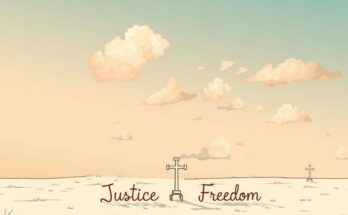Rights group Human Rights Watch has reported an alarming rise in unlawful executions in Iraq, with many carried out without legal representation or family knowledge. The Iraqi government is accused of using flawed trials and torture to justify these executions, often linked to terrorism and drug offenses. With a lack of transparency and systemic abuses prevalent, activists are urging for judicial reforms and the abolition of capital punishment.
In the shadowy corners of Iraq’s justice system, a chilling surge in unlawful executions has been reported, echoing a grim reality that plagues the nation. Human Rights Watch has brought to light that in 2024, executions have dramatically escalated, occurring without the knowledge of lawyers or families, thus shrouding these acts in secrecy. With monitoring groups observing at least 50 men executed in September alone, it indicates a dire atmosphere overshadowed by both intimidation and a lack of accountability from the government.
The law, intended to safeguard citizens, has morphed into a heavy-handed tool wielded against them, often applying the death penalty under dubious terrorism charges with evidence as fragile as sand. Furthermore, reports of torture and coerced confessions are rampant, turning prisons into haunted houses of despair. Labeled as “state-sanctioned murder” by activists, the executions undermine the very fabric of human rights and justice, staining the legacy of President Abdul Latif Rashid with blood.
The Iraqi Prime Minister, in a recent conference, alarmingly placed drug-related crimes at the heart of national security, likening the war on narcotics to a battle against terrorism. Yet, this prioritization raises concerns as it leads to harsher penalties and further executions. As Iraq grapples with becoming a leading hub for unlawful executions, the call from advocates is clear: meaningful reforms in the judiciary and abolition of the death penalty are essential to restore dignity and humanity in law enforcement.
The backdrop of this unsettling narrative is Iraq’s long-standing use of capital punishment, which has one of the highest rates globally, despite clear evidence of flawed legal processes. Systemic issues such as torture, forced confessions, and isolation complicate the judiciary, making many convictions questionable at best. As the country struggles with pervasive violence and rampant drug issues, the government has adopted a draconian stance towards crime, which has led to an alarming increase in executions. The intertwining of anti-terrorism measures and drug offenses with a lack of transparency compounds the societal and legal crises facing Iraq.
Iraq stands at a crucial juncture in its struggle for justice, where the surge of unlawful executions emphasizes a grim reality for its citizens. The urgent call from human rights advocates is for sweeping reforms and the complete abolition of the death penalty. A move towards a just and humane judicial system is not just a necessity; it’s an opportunity for Iraq to redefine itself in the eyes of the world—a chance to emerge from the shadow of violence and to foster a culture of accountability and respect for human rights.
Original Source: www.middleeasteye.net



